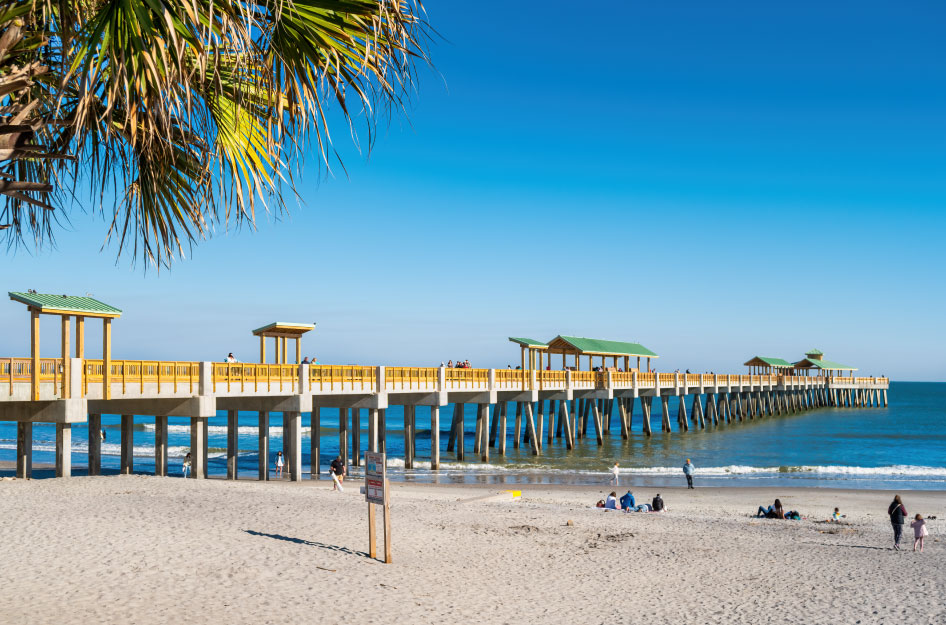Retiring in Tennessee: 6 of the Best Spots to Enjoy Mountains, Music, and Money-Saving
RetirementTennessee

Whether you’re in search of small-town charm, a thriving city, or the beauty of the Great Smoky Mountains, Tennessee has plenty to offer — especially for retirees. If you’re considering retiring in Tennessee, read on! Our guide will explore the benefits of the Volunteer State, take a look at some pros and cons, and visit a few of the best places to retire in Tennessee.
| Planning a move to Tennessee? Start by getting a free quote from PODS. |
What Are the Benefits of Retiring in Tennessee?
When it comes to planning for retirement, you might be looking for things like:
- Access to good healthcare
- Public transportation
- Affordable housing
- Pleasant weather year-round
- Recreational options
- A relaxed lifestyle
Tennessee is a great place to find all of these qualities — and more. For a deeper dive into what retiring in Tennessee is all about, check out the Retire Tennessee program, a notable government initiative that offers resources and services for seniors moving to the state.
Retiring in Tennessee — Pros and Cons
Tennessee has a lot to offer retirees, but just like any state, it has a few not-so-great qualities. So, before you load up the truck and move to Tennessee, here’s a quick look at some of the pros and cons.
Pro: Affordable Housing
Many retirees choose to downsize their homes to cut back on some of those pricey real estate costs. And while buying a home (even a small one) can still be pretty expensive, Tennessee's average home price of around $336,100 is lower than the national average of $368,000.
Con: Lack of Public Transportation
If you don’t have a car, moving to a small town in Tennessee might not be the best idea. Even living just outside of larger towns like Nashville and Memphis isn’t going to leave you with a lot of options for getting around. And because of Tennessee's weaker public transportation system, traffic can get pretty bad. Nashville, for instance, while definitely one of the best places to retire in Tennessee, is ranked No. 11 among cities in the U.S. with the worst traffic. Be sure to take that into account if you’re not a patient driver.
Pro: Endless Entertainment Options
Tennessee’s capital is Music City, U.S.A., with almost infinite options for entertainment. The iconic Grand Ole Opry and Ryman Auditorium, the Country Music Hall of Fame and Museum, and the world-famous Broadway honkytonks are just a few Nashville spots seniors with the dance bug might want to check out. Other places in the Volunteer State offer fun destinations, too — Pigeon Forge, for example, is packed with entertainment options like Dollywood, several country-themed dinner theater sites, and more. Memphis, down in the southwest corner of the state by the Mississippi River, is home to Elvis’s Graceland, the Stax Museum of American Soul Music, and Sun Studio, where too many luminaries to mention got their start. You’ll also find museums, galleries, and historic sites in just about every city in the state.
Con: Higher Crime Rates
Unfortunately, Tennessee ranks as the fourth most dangerous state in the U.S., with a violent crime rate of 628 per 100,000 and a property crime rate of 2,362 per 100,000. That doesn’t mean there aren’t plenty of safe cities throughout the state, though, and it doesn’t mean retiring in Tennessee puts you in danger. Crime is present in most major U.S. cities, and there are safety measures you can take, like always staying aware of your surroundings. Individual risk is also going to fluctuate based on where you are and any situations you might be dealing with.
Pro: Natural Beauty Wherever You Look
When you’re thinking about retiring in Tennessee, pros and cons invariably start with the biggest pro of all: It is home to some of the most beautiful landscapes in the entire nation, including the Great Smoky Mountains National Park, the most-visited national park in the U.S. In Middle Tennessee, the Natchez Trace Parkway runs from Nashville all the way to Mississippi, with stunning scenery and notable sites related to the Native American history of the region. And the Mississippi River along the western border of Tennessee offers its own beauty and wildlife, with dozens of parks and historical sites to explore along the way.
Retiring in Tennessee — FAQs
Q: Is Tennessee a good state to retire in?
A: With low tax rates, affordable housing, a low cost of living, natural beauty, and so many fun things to do, Tennessee is a great place for retirement.
Q: Where is the best place in Tennessee to retire?
A: There are so many places to choose from when you’re considering retiring in Tennessee, from big cities to quaint small towns. But if we had to pick: Lookout Mountain takes the No. 1 spot, thanks to its gorgeous scenery, proximity to Chattanooga and Nashville, and quiet lifestyle coveted by many retirees.
Q: Is Tennessee or Florida better for retirees?
A: The answer to this question depends on your specific interests and lifestyle desires, of course. Tennessee’s cost of living is 89.9, about 10 percent lower than the national average, while Florida’s is 3 percent higher. The Sunshine State’s beaches and year-round warm weather make it a favorite. But retiring in Tennessee means mountains and rivers to hike and explore, four distinct seasons (including beautiful fall foliage!), and easier access to the rest of the country — great for retirees who frequently visit family elsewhere.
Q: How much money do you need to retire comfortably in Tennessee?
A: In Tennessee, you’ll need about $34,000 a year including Social Security in order to retire comfortably. As for estimated savings recommended for financially secure Golden Years starting at age 65, the state ranks seventh-lowest in the nation at about $510,000.
The Best Cities to Retire in Tennessee
The Volunteer State is home to many great cities and towns with different characteristics, attractions, and costs. Here are a few of our top picks for the best places to retire in Tennessee.

Retiring in Tennessee’s eastern metro of Knoxville means fall football at UT, home of the Volunteers.
1. Knoxville, TN
- Average rent (one-bedroom): $1,725
- Average home value: $368,500
- Great for: Outdoor activities, sports enthusiasts, slower-paced lifestyle than other big cities
Located in East Tennessee, the city of Knoxville is only about an hour away from the Great Smoky Mountains National Park. It’s also home to the University of Tennessee, where the Volunteers play. (Sunday football, anyone?)
With a population of about 199,000, the city is only about one-third the size of Memphis, so retiring in Knoxville, Tennessee, might be a great option if you’re looking to experience city living while avoiding the crowds.
2. Gray, TN
- Average rent (one-bedroom): $1,475
- Average home value: $311,300
- Great for: Outdoor activities, farmers markets, local events
The small Tennessee town of Gray is situated in the foothills of the Appalachian Mountains, with endless opportunities for outdoor fun like fishing, hiking, and camping. There are also plenty of local events for retirees (and younger folks, too!) to enjoy, including the nearby Jonesborough Farmers Market, which runs every Saturday from early May through late October, and the Farmers Market at Gray Fairgrounds, every Wednesday and Saturday, May through September.
3. Chattanooga, TN
- Average rent (one-bedroom): $1,475
- Average home value: $328,700
- Great for: Great weather, outdoor activities, fun attractions
If you want to experience all four seasons but prefer to stay away from snow, retiring in Chattanooga, TN, may be just what you need. Located just north of Georgia's state line, the city has great weather year-round and experiences mild winters.
The Tennessee River runs through Chattanooga’s north side, carving out a gorge known as Tennessee’s Grand Canyon, with amazing trails and sites to explore. Guided river tours are available, departing in a variety of boats from Ross’s Landing at the Chattanooga Pier. If you’re looking for entertainment, check out the Riverfront, a lively destination for dining, shopping, and neighborhood festivals.

Lookout Mountain’s Lover’s Leap waterfall overlooks amazing views of the surrounding Tennessee landscape.
4. Lookout Mountain, TN
- Average rent (one-bedroom): N/A
- Average home value: $1.03M
- Great for: Fun attractions, outdoor activities, great local establishments
Less than 30 minutes outside of Chattanooga, Lookout Mountain is a great suburb — and a popular tourist destination, so if your definition of retiring in Tennessee does not include sharing space with lots of new folks every season, this might not be where you want to spend your Golden Years.
Lookout Mountain has plenty of great amenities, beautiful homes, and amazing views (of course). It’s home to Ruby Falls, where guests descend in a glass-front elevator 260 feet to view one of the world's most spectacular underground waterfalls. Another notable attraction is Rock City, a famous tourist hub known for ancient rock formations, panoramic views across seven states, and caverns outfitted with art installations and other effects.
5. Nashville, TN
- Average rent (one-bedroom): $1,825
- Average home value: $447,600
- Great for: Access to medical resources, music lovers, entertainment, shopping, dining
Retiring in Nashville, Tennessee, also means unique local boutiques like Uncommon James (founded by reality TV’s Kristin Cavallari), Emerson Grace, and Kittenish. And the dining scene is off the charts — from its renowned hot chicken (Bolton’s is the best) to innovative award-winning chefs like Sean Brock, whose latest venture is Sho Pizza Bar.
6. Germantown, TN
- Average rent (one-bedroom): $1,900
- Average home value: $493,300
- Great for: Natural beauty, outdoor activities, music lovers, local events
Just outside of Memphis in the most southwestern part of the state, Germantown is a charming suburb with plenty of green space and a walkable downtown. Outdoor lovers will enjoy parks including the Wolf River Greenway and Nature Area, ideal for spending a leisurely afternoon walking, biking, or relaxing with a picnic. The annual Germantown Charity Horse Show, more than 75 years old, raises funds for local charities and is always a popular attraction for residents and visitors.
Dining starts with Memphis-style barbecue, of course, at the Commissary, a Germantown institution since 1981. For a more upscale experience, Southern Social offers local and regional favorites in a quaint setting adjacent to the historic Germantown Depot. Live music fans can hop over to world-famous Beale Street in Memphis for blues and R&B, but thanks to the Germantown Performing Arts Center, host of year-round concerts of every flavor, you don’t have to go far.

Retiring in Tennessee has plenty of financial benefits, including no state income tax.
How Much Money Do You Need to Retire Comfortably in Tennessee?.
If you’re set on retiring in Tennessee, you’ll need about $34,000 a year, including social security in order to live comfortably in retirement. The state ranks seventh-lowest in the U.S. for how much retirees will need in savings — at age 60, about $679,700; at 65, about $510,000; and at 70, $339,800. These figures are just ballpark, of course; your own lifestyle and preferences will have a big influence on how much you really need to feel comfortable and financially secure.
So is Tennessee a good place to retire, financially speaking? First things first, Tennessee doesn’t have a state income tax, including social security and retirement savings. Public and private pensions, along with withdrawals from retirement accounts, are also not taxed.
The overall cost of living is also less than the rest of the U.S., coming in at 89.9 – about 10 percent lower than average. And various expenses, such as food, housing, and healthcare, are cheaper — even in big cities like Knoxville — than they are in other states.
And when compared to other Southern states, Tennessee is among the lowest when it comes to cost of living — especially when paired up with Florida. There, the cost of living is more than 3 percent higher than the national average. Neighboring North Carolina is slightly higher at about 9 percent lower than average, and South Carolina is just about equal to Tennessee.

Moving is much easier with PODS portable storage containers, delivered right to your doorstep and ready to pack on your own schedule.
Retiring in Tennessee: Making the Move
To make your move to Tennessee simple and flexible, a portable moving container from PODS is the way to go. PODS will deliver the right-sized container to your doorstep, where you can pack and load on your own schedule. Once you’re ready, they’ll send someone to pick it up and take it to your new home in the Volunteer State. If you need a little time before you’re ready to unload, that’s fine, too — one month of storage is included with every PODS move.
| Visit PODS online for a free local moving quote or call 877-350-7637 for long-distance moving. |
Editor’s note: Average and median rent prices were obtained from RentCafe; and average home values were obtained from Zillow. For ease of reading, monthly rental prices were rounded to the nearest $25, and home values were rounded to the nearest $100. Values in the millions were rounded to the nearest $100,000.

Your quote in 60 seconds
Get pricing tailored to your needs!








